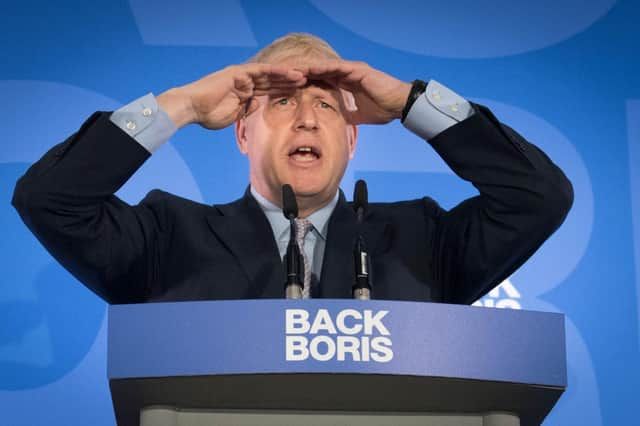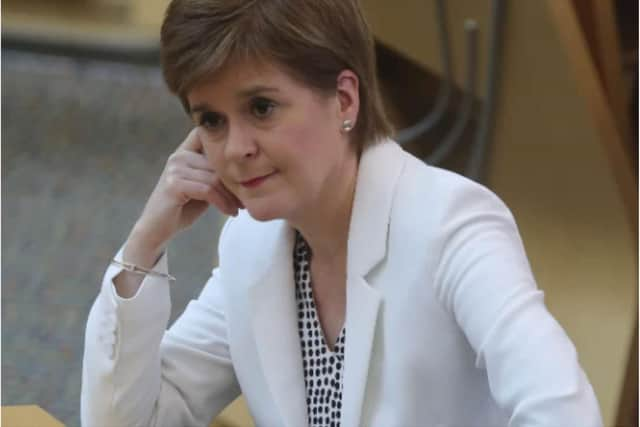Scottish independence: Is Boris Johnson the right person to captain the unionist team as Holyrood elections loom? – John McLellan


As has been pointed out repeatedly since, it sets up a date with England on June 18 next year, the anniversary of the Battle of Waterloo when I imagine quite a few of today’s Tartan Army will wish the Scots Greys and Ensign Ewart had charged in the opposite direction alongside the Polish lancers, who signed up with Napoleon as the best chance of getting rid of the Russians, Prussians and Austrians who had progressively divvied up their homeland.
Ex-deputy SNP leader Jim Sillars famously coined the phrase “90-minute nationalists” to describe the patriotic fervour which rose and fell with fortunes on the sports field and next year’s tournament will only be weeks after the Scottish Parliament elections when, if current polling holds up, the SNP will have secured a second absolute majority in a system designed to prevent it. So the concept of 90-minute nationalism has seemingly been consigned to Scottish political history.
Advertisement
Hide AdAdvertisement
Hide AdThe latest YouGov poll published on Thursday shows little significant change in either Holyrood voting intentions or approval ratings for Boris Johnson, who 74 per cent of Scots think is doing badly. After this week’s public relations disaster of the resignation of his communications chief Lee Cain, amidst suggestions that the Prime Minister’s fiancée Carrie Symonds had opposed Mr Cain’s promotion to Chief of Staff, and now the immediate departure of controversial senior adviser Dominic Cummings, the only way is up.
A more positive case for the Union?
With the Scottish elections barely six months away and polls still showing the SNP on course for an overall majority, it has never been more important for the unionist cause that the UK government demonstrates a sense of grip, but the events of the week have merely emphasised the impression of an administration in perpetual chaos. No matter the reality or the circumstances, no national leader will want the public to perceive that major government appointments hinge on breakfast table discussions and the sudden departure of Mr Cummings looks like a bid to regain authority. Politics is a hard game, but it’s a high price to pay for yesterday’s Craigentinny and Duddingston council by-election result.
Will this usher in a “softer and less dogmatic” approach to Scotland, as sources claimed yesterday, and a more positive case for the Union than just saying no to another independence referendum?


The wisdom of an absolute rejection of a referendum has always been suspect when it effectively defuses the previously successful Conservative “Say no” campaign message if it appears the decision has already been taken and hands the SNP a defiant rallying call. The Scotland Office communications team is being beefed up, but the UK strategists will have to listen hard to advice from Scotland if ground is to be regained.
The rush of optimism which greeted the announcement of the stunning success of the Pfizer Covid-19 vaccine and the promise of a permanent return to normality next year at least gives Downing Street the chance to show a sense of direction and momentum towards mass inoculation in the spring.
Sturgeon’s ratings slip
But First Minister Nicola Sturgeon has the same opportunity and can build on the clear majority of Scots who endorse her regional approach to Covid restrictions rather than the blanket lockdown currently imposed on England, despite the effect across much of Scotland being much the same.
However, her team will also have noted her approval rating in the YouGov survey slipped from the eight in ten who thought she was handling the crisis well in August to seven in ten now, and while alarm would be putting it too strongly, they won’t want to see it drop further.
That dip could be down to the problems which continue to dog the First Minister, like the denial of responsibility for care home deaths, the continued uncertainty over next year’s Higher exams and the continued failure to hand over documents to the Salmond inquiry.
Advertisement
Hide AdAdvertisement
Hide AdMaybe Team Sturgeon looks at the polls and calculates that none of it is making a big enough impression on voters to worry about – the SNP won Craigentinny and Duddingston with a two per cent increase in vote share -- but that approval slip might dispel notions of complacency.
Pressure for a second referendum
And then there is the Hate Crime Bill, and if the tetchy approach by some SNP members of the Justice Committee on Tuesday when I gave evidence was anything to go by, then perhaps criticism is beginning to take its toll.
“Is there anything you like about this bill?” asked Rona Mackay MSP, as if I should be happy about legislation with the potential to send journalists to prison for seven years for expressing robust opinions someone doesn’t like, and which the Faculty of Advocates has described as unamendable.
With predictions of an overall majority after May, it’s still a mystery why the SNP doesn’t shelve the bill for now, rather than press on and risk seeing it shredded with the embarrassment that would entail.
But it was YouGov’s findings on the independence question which were the most interesting, with the 51:49 in favour of separation, compared to 53:47 in August and the 58 per cent in the Ipsos/Mori poll for STV last month. Drilling further down, when Don’t Knows are included, backing for independence is actually at 45 per cent, which vindicates the First Minister’s cautious approach to another referendum.
But with 38 per cent thinking a majority SNP Scottish government should hold a referendum without UK Government approval, the pressure on her to do so under those circumstances will be intense.
By June 18 there could be a lot more at stake than a game of football, but the question for the Conservative selectors is whether Boris Johnson captains the starting XI.
This article has been edited as it was Jim Sillars, not Alex Salmond, who coined the phrase “90-minute nationalists”
A message from the Editor:
Thank you for reading this article. We're more reliant on your support than ever as the shift in consumer habits brought about by coronavirus impacts our advertisers.
If you haven't already, please consider supporting our trusted, fact-checked journalism by taking out a digital subscription.
Comments
Want to join the conversation? Please or to comment on this article.